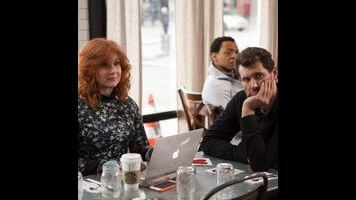Hulu’s esoteric Difficult People returns in fine, funny form for season 2

Hulu’s Difficult People is the kind of cult-friendly comedy that doesn’t typically last long on a broadcast network, a hangout sitcom populated with characters many people wouldn’t care to hang out with. The issue is not that central besties Julie (creator Julie Klausner) and Billy (Billy Eichner) embody the show’s curmudgeonly title—though they certainly do—but that their inside jokes will sail over the heads of all but the most rabid pop-culture omnivores. Like Happy Endings and Community, People continues to lean heavily on minute referential humor. Those who would enjoy Julie and Billy’s companionship in real life will have just as much fun watching them on television, while those who wouldn’t are doomed to smile, nod, and pretend they get the joke.
In a bygone television world, People’s esoteric qualities would have its fans planning letter-writing campaigns to save it from cancellation before the pilot even finished. But with audiences fragmenting into smaller and smaller slices, a narrow-band sitcom like People can find the right-sized audience to revel in Julie and Billy’s cool-kid musings. In one new episode, Julie, an aspiring television writer, gets an opportunity to pitch to a group of influential industry decision-makers. Her most compelling idea is a season of FX’s tentpole franchise called American Horror Story: We Promise We Thought It Through This Time. In another scene, Julie and Billy lament the cancellation of American Comedy Story, which starred Keegan-Michael Key as Sinbad. For those tickled by that kind of pop-culture sideswipe, Difficult People is a godsend.

 Keep scrolling for more great stories from The A.V. Club.
Keep scrolling for more great stories from The A.V. Club.